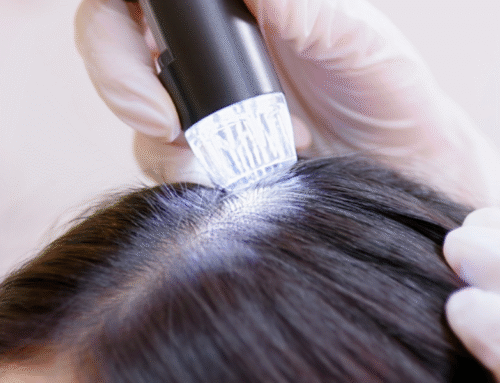In the quest for stronger, shinier, and fuller hair, we often focus on treatments, products, and hair care routines, without realizing that one of the most influential factors for hair health happens while we sleep. Yes, we’re talking about sleep. Getting quality rest not only recharges your energy, boosts your mood, and strengthens your immune system—it also plays a key role in hair growth and regeneration.
The connection between nighttime rest and the condition of your hair is closer than you might think. In this article, we’ll explain why the quality of your sleep can make the difference between brittle, weakened strands and a vibrant, healthy mane—plus practical tips to improve your sleep habits and optimize scalp care.
What Happens to Your Hair While You Sleep?
During deep sleep, the body activates essential processes of cellular repair and regeneration. This includes the endocrine system, which regulates crucial hormones for hair health, such as growth hormone (GH) and melatonin. Both influence the hair follicle life cycle, promoting the growth of new hair and strengthening existing strands.
Additionally, quality sleep helps lower cortisol levels—the stress hormone—which also positively impacts hair loss. Adequate rest promotes better blood circulation, allowing more oxygen and nutrients to reach the scalp and nourish hair follicles.
Getting 7 to 9 hours of sleep per night is ideal to reduce and stabilize cortisol levels and support overall hair vitality.
What Happens When You Don’t Sleep Well?
Chronic insomnia or poor-quality sleep can disrupt your hormonal balance and trigger a range of issues such as:
· Increased cortisol levels, accelerating hair loss
· Reduced blood flow to the scalp
· Disrupted melatonin production, which protects hair follicles
· Impaired absorption of essential nutrients like iron and zinc, vital for hair growth
As a result, your hair may become thinner, weaker, and less voluminous. In prolonged cases, it can lead to noticeable hair loss.
Melatonin and Hair Growth: A Key Relationship
Melatonin, also known as the “sleep hormone,” is produced by the brain at night. Besides regulating your circadian rhythm, recent research shows that melatonin also has antioxidant properties that help protect hair follicles from environmental damage and premature aging.
Topical melatonin treatments have shown promising results in promoting hair growth in people with androgenetic alopecia or diffuse thinning. However, supporting your body’s natural melatonin production through restful sleep remains the most effective foundation.
How Many Hours Should You Sleep for Healthy Hair?
Experts recommend 7 to 9 hours of sleep per night to allow the body to carry out its regenerative processes effectively. But it’s not just about quantity—quality matters just as much. Interrupted or shallow sleep can interfere with the deeper sleep cycles where the most intense cellular repair takes place.
Tips to Improve Sleep and Boost Hair Health
Good sleep may seem like a luxury in modern life, but it’s one of the best investments you can make in your health—and in your hair’s beauty. Here are some practical tips:
1. Create a Relaxing Nighttime Routine
Go to bed and wake up at consistent times. Turn off screens at least an hour before sleep and engage in calming activities like reading, listening to soft music, or meditating.
2. Optimize Your Sleep Environment
Your bedroom should feel like a sanctuary. Keep it cool, dark, and quiet. Use a comfortable mattress and pillow, and consider sleeping on a silk pillowcase to reduce hair friction and frizz.
3. Care for Your Hair Before Bed
Avoid going to bed with wet hair, as it can weaken the strands. Apply targeted nighttime treatments—such as nourishing serums, lightweight oils, or scalp tonics—to strengthen your scalp as you sleep. Look for ingredients like biotin, caffeine, or rosemary to stimulate growth.
4. Avoid Stimulants Before Bed
Cut back on caffeine or energy drinks after 4 p.m. Avoid heavy or sugary meals before bedtime, as they can interfere with your circadian rhythm.
5. Add Supplements if Necessary
If your lifestyle makes it hard to get all the nutrients your hair needs, consider adding melatonin supplements (under professional guidance), as well as multivitamins that include biotin, zinc, and iron.
Your Hair Needs Rest Just as Much as You Do
Hair health isn’t just about what you apply externally—it’s deeply tied to your body’s internal balance. Restful sleep is not a luxury, but a biological necessity that can significantly affect the strength, appearance, and growth of your hair.
By developing healthy sleep habits and combining them with high-quality hair care products, you can restore vitality and strength to your hair. If you’re noticing excessive shedding, dullness, or thinning, don’t underestimate the power of a good night’s sleep as part of your recovery strategy.
Ready to transform your hair’s health?
At HairWise, we offer expert advice, treatments, and products to help your hair look stronger and healthier than ever. Discover our hair care solutions and start giving your hair the attention it deserves. Visit us at 245 SE 1st ST #201, Miami, FL 33131 and find the perfect treatment for you.
Your hair will thank you!





